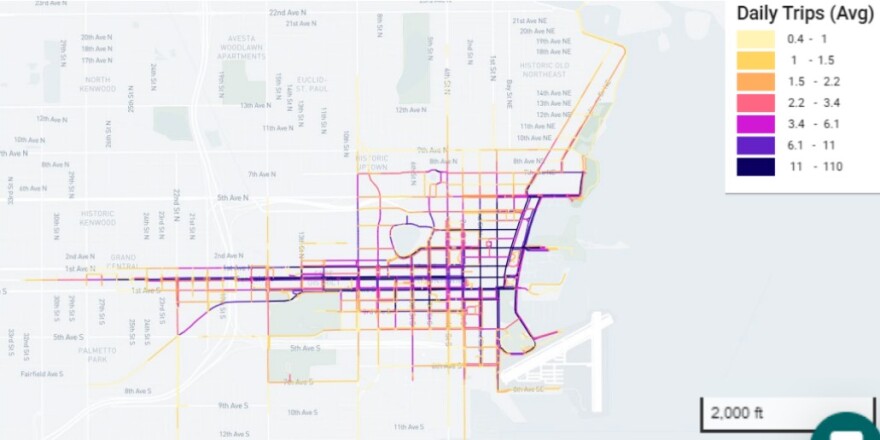St. Petersburg will soon have 900 new, technologically advanced electric scooters amid ongoing efforts to increase mobility.
The city-sponsored initiative has generated about $1 million in right-of-way usage fees since a pilot program began in 2020. St. Petersburg has not recorded an incident involving shared scooters since 2023.
Administrators recently selected two new companies, Lime and Spin, to oversee the initiative. City council members heard an update on the evolving program at a May 8 committee meeting.
“It’s really interesting to see how the technology is moving forward to increase safety and help enforce those regulations that lead to safer practices,” said Councilmember Gina Driscoll. “It’s great to see we’re at this place right now.”
Unlike many cities, St. Petersburg has prohibited riding on sidewalks and required users to park in corrals since the program’s launch. Veo and Razor initially provided the scooters and operated the service.
Residents and visitors took nearly 1.25 million trips between Oct. 29, 2020, and April 27. May is the busiest month with a 28,500-ride average.
The program averages 761 trips daily, and demand spikes on the weekends. St. Pete Pride attendees set a record June 24, 2023, with 4,053 rides.
Nine of the city’s 19 scooter share incidents occurred in 2021. Driscoll noted the program’s learning curve, particularly as some cities encourage or mandate riding on sidewalks.
A fatal crash occurred in 2023 when a scooter user, illegally carrying a passenger and riding on the sidewalk, hit a pedestrian. Sgt. Mike Shade said the St. Petersburg Police Department subsequently conducted a “significant” enforcement campaign, and “we have really seen the results of that.”
He said violations are now “pretty much nonexistent.” Behavior on faster, privately owned scooters remains an issue.
“Based on the program’s success, our staff has been invited to speak at various state and national conferences to educate other cities about some of the best practices that we did develop here,” said Evan Mory, director of transportation and parking management. “Another great aspect of our program is that we reinvest the revenues from our scooter share into making our infrastructure safer and more inviting, not only for people to ride scooters, but also for people to walk.”
Program enhancements
Veo became the city’s only operator when Razor discontinued its scooter share service in 2023. A request for proposals issued included several new requirements, and officials will charge a $250 annual right-of-way fee for each scooter.
Lime and Spin must equip scooters with GPS, limit speeds to 15 mph, have geofencing tech to enforce corral compliance and area restrictions and provide safety education and public outreach. Each company will provide 450 vehicles; that number will increase as the city creates additional parking spaces.
Lime already operates St. Petersburg’s electric bicycle share program, and officials believe competition will keep prices lower for consumers. The company will initially implement a camera-based sidewalk detection system on 20% of its fleet.
In-app and audible scooter alerts will notify riders when they are on sidewalks or in prohibited areas. Transportation manager Cheryl Stacks said the city is creating 18 new corrals to accommodate 200 additional scooters.
Trips average 1.1 miles and primary routes are along Central Avenue, Bayshore Drive, Beach Drive and the Pinellas Trail, east of 22nd Street. Stacks said the city would station the new scooters “a little farther west” and north.

Mory said Forward Pinellas will sponsor a holistic micromobility study and explore remote operation farther south in the Skyway Marina District and north in the Carrillon area. “In the past, it’s been a little tough for operators to spread out that far, but it is something we’re looking to try to do.”
Spin provides scooter service in Tampa. The company will employ a 22-person, in-house local team and prioritize qualified applicants from the South St. Petersburg Community Redevelopment Area.
Spin’s scooters will feature a basket, dual braking and kickstands, turn signals, speedometers and sensor-based sidewalk systems. The technology can also discern wrong-way and double riding.
Lime and Spin will charge $1 to unlock the scooters and .39 cents or .42 cents per mile, respectively. While both companies provide discounts for low-income riders, Spin will offer cheaper fares to all residents and a vehicle distance-based pricing option that encourages safe operation.
Administrators will launch the revamped service with new operators in mid-June. Councilmember Brandi Gabbard noted the initial controversy surrounding the initiative has since subsided.
“We don’t want to minimize the incidents that have happened, but I think we are certainly on the right trajectory to doing this the right way,” Gabbard added. “So, I just want to applaud all of you … for what I think is a very responsible scooter share program. Obviously, with your national recognition, it has been proven.”
This content provided in partnership with StPeteCatalyst.com



